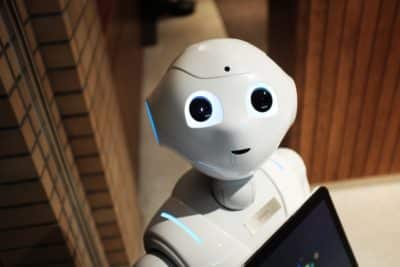Will software bots give rise to new job roles? Will human workers become obsolete? Did you know that Robotic Process Automation is “the fastest-growing segment of the global enterprise software market”? RPA is sure grabbing eyeballs across all industry segments. Along with the hype, many enterprises are wondering if the new wave of automation will transform the workplace and what are the repercussions if any.
What is RPA? RPA goes beyond automating rule-based tasks; it removes drudgery by enabling the human worker to focus on tasks that require creativity and judgment. An addition of intelligent capabilities such as NLP and Machine Learning, empower enterprises to reach new heights that were not possible earlier. From a significant reduction in human errors to improvement in productivity and employee satisfaction, Robotic Process Automation is changing the way we work.
There are a number of business processes such as accounting, invoicing, claims processing, etc. that have moved from the traditional ways of working and have incorporated new, digital tools. Infusing technology at work not only helps restructure the business processes but also integrates IT and business units.
IMAGE: PEXELS
Will Robots Make Work Smarter And Easier? Why Is There Resistance And Fear To Accept Change?
In order to bring about change across an enterprise, the synergy of people, process, technology is crucial. Having a change management framework in place helps remove the roadblocks on the road to digital transformation.
A change management framework that focuses on employee buy-in, having a clear automation roadmap, reskilling or training existing employees, and appointing leaders who will drive change enterprise-wide is the need of the hour.
Here Are A Few Ways RPA Is Transforming The Way We Work:
It provides employees an opportunity to reskill and focus on higher-value work: Monotonous work can be dreadful. Imagine deploying software bots to take over the repetitive, mundane tasks such as copy-pasting data, filling in forms, and scraping data from the web, so you can focus on tasks that require creativity and judgment?
Creates new job roles: Automation no doubt creates new job roles and responsibilities. In the future, humans and machines working alongside each other will become commonplace. Robotic Process Automation provides a great opportunity for employees to get trained on new technologies, thereby improving efficiency and productivity, thereby eliminating the fear of job loss.
Provides data-driven analytics and insights: In the age of digital transformation, we cannot afford to ignore data. Enterprises today are making data-driven decisions more than ever, collecting, storing and making sense of the massive unstructured data. With real-time data increasing tremendously, enterprises can digitize information from unstructured data sources and make better-informed decisions.
Creates better customer experiences: Enterprises aim to deliver consistent customer satisfaction. And, with robot-led automation, customer experience management is a breeze. Leveraging technologies such as Natural Language Processing and Machine Learning leads to real-time customer interactions and better analytics, wherein customer behavior and patterns are studied and made sense of, allowing human workers to create high-touch interactions.
Brings about digital transformation: RPA is the foundation block on which enterprises will transform digitally. It’s no doubt a main driver and enabler of digital transformation across industry verticals and functions. Automation helps businesses navigate the digital landscape, shaping your enterprise for generations to come.
Conclusion
Enterprises today are enthusiastic about unlocking the full potential of RPA. From collaborating with humans to creating personalized experiences, bots bring about change in unexpected ways. From better business operations and cost reduction to enhanced cycle time and better ROI, automation is transforming the way enterprises do business.
As technology and automation converge, humans and bots will work in close collaboration, transforming the way we do business. New gen robots amplify human capabilities, empowering enterprises to succeed in the digital era.
Enterprises are implementing changes at the grassroots level, and are getting rid of manual processes and conventional ways of working. Educating employees and the future human worker on the RPA wave is essential. It not only prepares them for a massive change but also emphasizes on creativity and reskilling of existing talent.
As the world notices, Robotic Process Automation, it will be interesting to see how humans and machines will work alongside each other in the years to come. Have you adopted an automation strategy yet?
If you are interested in even more technology-related articles and information from us here at Bit Rebels, then we have a lot to choose from.


COMMENTS